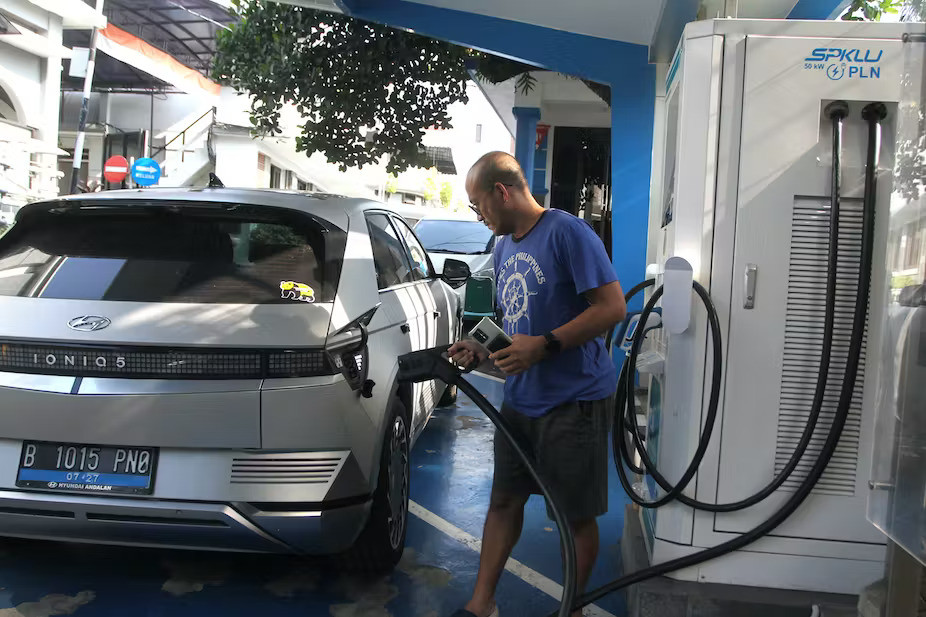Popular Reads
Top Results
Can't find what you're looking for?
View all search resultsPopular Reads
Top Results
Can't find what you're looking for?
View all search resultsWhy Indonesia needs a long-term plan beyond subsidies to electrify its transport
Sales of electric vehicles in Indonesia grew by an astonishing 680% in May 2023 compared to the year before, following the recent implementation of government subsidies.
Change text size
Gift Premium Articles
to Anyone
S
ales of electric vehicles in Indonesia grew by an astonishing 680% in May 2023 compared to the year before, following the recent implementation of government subsidies.
Since March this year, different ministries have been issuing regulations on Rp7 trillion (about US$456 million) worth of subsidies for people buying or converting electric motorbikes in 2023 and 2024, as well as reduced taxes for electric car purchases.
While those booming sales seem like good news, I believe the subsidy program is a temporary solution to push for widespread electric vehicle adoption.
In the long run, I – as a researcher in energy system analysis with more than ten years of experience in the energy sector – argue Indonesia must set a long-term plan to electrify its transport sector with much higher renewable energy.
My research concludes that Indonesia will benefit in at least two ways from setting a long-term plan. First, the country can significantly decrease energy subsidies by reducing fossil fuel consumption in both the transport and electricity sectors. Second, it will reduce carbon dioxide emissions from both sectors.
We need more renewables to power electric vehicles
A research review showed subsidy programs are an effective tool to boost electric vehicle ownership in select countries, such as the USA and Norway.
That 2017 review suggested one effective approach was to provide upfront grants or exemptions from value-added tax or purchase taxes. These incentives can encourage the ownership of emerging vehicles and promote their adoption in the market.
Subsidizing private electric vehicles is considered “low-hanging fruit” (an easily achieved task) for the Indonesian government to cut carbon dioxide emissions. That’s because private road vehicles consumed more than 70% of the total oil consumption in Indonesia’s transport sector.
In addition, electric vehicles are generally 2-3 times more energy-efficient than conventional vehicles. Electric vehicles have more efficient powertrains, using electric motors that convert a higher percentage of battery energy into useful power for driving. In contrast, conventional vehicles experience energy losses through heat and friction during combustion.
The problem is that Indonesia’s electricity sector still heavily relies on coal, which accounted for 62% of total electricity generation in 2022, meaning that electric vehicles on Indonesia’s streets are still dominantly powered by fossil fuels.
That’s why it is important for the Indonesian government to ensure subsidies for electric vehicles align with wider plans for Indonesia’s energy transition in the transport sector.
This includes plans to electrify all transport means and to use alternative fuels, such as hydrogen and electro fuels.
To achieve wider plans in the transport sector, Indonesia needs to do more to boost renewable energy in its electricity sector.
At the moment, the government is still struggling to meet the country’s target of 23% renewable energy share by 2025.
Subsidy debates
Indonesia’s subsidies for electric vehicles has sparked debate. One of the main arguments against such subsidies is its Rp7 trillion cost to the Indonesian government’s tight budget.
Any new subsidy is always an additional cost for any government. In addition to that, the subsidy only targets high-income groups as they are the ones who can afford buying this kind of vehicle.
Such subsidies can also disrupt the market by artificially increasing demand for electric vehicles.
It is important to note that there was already a high demand for electric vehicles in Indonesia even before subsidies were distributed, as indicated by the long waiting list of customers eager to purchase them.
3 pillars of a long-term plan
We should not view subsidies as an effective and sustainable solution in the long run for the transport sector’s energy transition.
Instead, Indonesia should create its long-term plan based on three pillars.
1) Avoid: Indonesia should make its transportation sector more efficient by making residential, work and leisure areas in every city closer to each other. Therefore, the need for motorized travel and the trip length can be reduced.
2) Shift: Indonesia must encourage the public to use more eco-friendly transportation, by promoting public transportation or active transport such as cycling and walking.
Several studies across the globe, such as in Poland and China, show bus electrification can greatly reduce carbon dioxide emissions in big cities. Furthermore, electric buses will be more cost-effective than conventional buses in the medium and long-term.
3) Improve: Indonesia should refine its public transportation to be more environmentally friendly and attractive. Transport electrification is the key in this pillar.
Using renewable energy-based electricity to power the transport sector will play a crucial role in a fully decarbonized Indonesian energy system. This will also be for the greater good of the Indonesian people and the environment.
Providing subsidies for electric vehicles should be only the first small step in a long-term plan to electrify Indonesia’s transport – driven increasingly by renewables, not coal-fired electricity.











